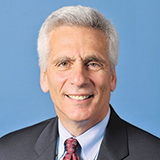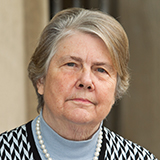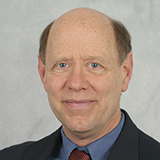
Jared Bernstein joined the Center on Budget and Policy Priorities as a senior fellow in May 2011. His areas of expertise include federal and state economic and fiscal policies; income inequality and mobility; trends in employment and earnings; international comparisons; and the analysis of financial and housing markets. From 2009 to 2011, Bernstein was the chief economist and economic adviser to Vice President Joe Biden, executive director of the White House Task Force on the Middle Class, and a member of President Obama’s economic team. Prior to joining the Obama administration, he was a senior economist and the director of the Living Standards Program at the Economic Policy Institute in Washington, DC. Between 1995 and 1996, Bernstein was deputy chief economist at the U.S. Department of Labor. He is the author and coauthor of numerous books for both popular and academic audiences, including Crunch: Why Do I Feel So Squeezed? (2008) and nine editions of The State of Working America, has published extensively in major newspapers, hosts a popular economics blog, and is an on-air commentator for CNBC and MSNBC. Bernstein has a B.F.A. from the Manhattan School of Music, a M.S.W. from the School of Social Work at Hunter College, a M.A. in philosophy and a Ph.D. in social welfare from Columbia University.

Angela Glover Blackwell is the chief executive officer of PolicyLink, which she founded in 1999 with the mission to advance economic and social equity. PolicyLink has become a leading voice in the movement to use public policy to improve access and opportunity for all low-income people and communities of color, particularly in the areas of education, health, housing, infrastructure, and transportation. Prior to founding PolicyLink, Blackwell served as senior vice president at the Rockefeller Foundation, where she oversaw its domestic and cultural divisions. She gained national recognition as founder of the Oakland (CA) Urban Strategies Council, where she pioneered new approaches to neighborhood revitalization. From 1977 to 1987, she was a partner at Public Advocates, a nationally known public interest law firm. Blackwell is the coauthor of Uncommon Common Ground: Race and America’s Future (2010). She served as co-chair of the Task Force on Poverty conducted by the Center for American Progress, which together with PolicyLink wrote and released All in the Nation: An America that Works for All (2013). She earned a bachelor’s degree from Howard University and a J.D. from the University of California at Berkeley.

Katharine Bradbury is a senior economist and policy advisor in the research department at the Federal Reserve Bank of Boston. Her work focuses on income inequality and income mobility; labor force participation and other topics in labor economics; state and local public finance issues; and the New England regional economy. Her two most recent research projects have examined (i) the impact of unemployment insurance on labor force participation and job finding among the long-term unemployed during the Great Recession and recovery to date and (ii) how mid-year student turnover in the Boston Public Schools, especially turnover resulting from residential moves, has negative spillover effects on other students in the school (with coauthors Mary A. Burke and Robert K. Triest). Bradbury serves on the editorial boards for Mass Benchmarks and the Boston Fed’s magazine Communities and Banking. Prior to joining the Bank in 1981, she worked as a research associate at the Brookings Institution and at the Institute for Research on Poverty at the University of Wisconsin at Madison. Before going to graduate school, Bradbury served as a Peace Corps volunteer in the Mariana Islands. She earned a B.A. in economics from Carleton College and a Ph.D. in economics from the Massachusetts Institute of Technology.

Mitchell D. Chester began his tenure as commissioner of the Massachusetts Department Elementary and Secondary Education in May 2008. From 2001 through 2008 he worked for the Ohio Department of Education, where he was the state’s second ranking educator. Chester served as the executive director for Accountability and Assessment for the School District of Philadelphia from 1997 through 2001. Prior to this position, he was chief of the Bureau of Curriculum and Instructional Programs of the Connecticut State Department of Education. Chester began his career as an elementary school teacher in Connecticut, then became a middle school assistant principal and a district curriculum coordinator. He is a past president and a current board member of the Council of Chief State School Officers and chairs the governing board of the Partnership for the Assessment of Readiness for College and Careers (PARCC). Chester has a B.S. in elementary education from the University of Connecticut; a M.Ed. from the University of Hartford; a sixth-year diploma, with a concentration in educational administration, from the University of Connecticut; a M.Ed. and an Ed.D. from Harvard University’s Graduate School of Education.

Miles Corak is a full professor of economics with the Graduate School of Public and International Affairs at the University of Ottawa, which he joined in 2007. During the 2013–2014 academic year Corak is a visiting scholar at the Russell Sage Foundation. His research focuses on labor markets and social policy—with a special emphasis on child poverty; access to university education; social and economic mobility; and unemployment. Corak’s most recent paper, “Income Inequality, Equality of Opportunity, and Intergenerational Mobility,” published in the Journal of Economic Perspectives, examines the relationship between inequality and social mobility across countries, a relationship that has become known as the “Great Gatsby Curve.” Prior to his current position, Corak worked for twenty years in the Canadian federal government, spending most of that time as a senior manager at Statistics Canada. Corak has been a visiting researcher with the UNICEF Innocenti Research Centre in Florence, Italy; with the Centre for Longitudinal Studies at the University of London; and with the Office of Population Research at Princeton University. He has a B.A. in economics and political science from McGill University, a M.A. in economics from McGill University, and a Ph.D. in economics from Queen’s University.

Sheldon H. Danziger is the president of the Russell Sage Foundation, a post he began in 2013. Prior to his current position, he was the Henry J. Meyer Distinguished University Professor of Public Policy at the Gerald R. Ford School of Public Policy, research professor at the Population Studies Center, and director of the National Poverty Center at the University of Michigan at Ann Arbor. Between 1989 and 2013, Danziger directed the Research and Training Program on Poverty and Public Policy at the University of Michigan, a training and mentorship program for developing the careers of emerging scholars from underrepresented groups. Before joining the University of Michigan in 1988, Danziger taught at the University of Wisconsin at Madison, where from 1983 through 1988 he directed its Institute for Research on Poverty. His most recent book is Legacies of the War on Poverty (coedited with Martha Bailey, 2013). Among the books that Danziger has written or coedit ed, three have been select ed as noteworthy books in labor economics and industrial relations by Princeton University’s Industrial Relations Section: The Price of Independence: The Economics of Early Adulthood (coedited with Cecilia Rouse, 2007); Working and Poor: How Economic Conditions and Policy Changes Affect Low-Wage Workers (coedited with Rebecca Blank and Robert Schoeni, 2006); and America Unequal (coauthored with Peter Gottschalk, 1995). Danziger is a member of the American Academy of Arts and Sciences and a John Kenneth Galbraith Fellow of the American Academy of Political and Social Science. He has a B.A. in economics from Columbia University and a Ph.D. in economics from the Massachusetts Institute of Technology.

Michael S. Dukakis joined Northeastern University as the Distinguished Professor of Political Science in June 1991, when he also began a concurrent appointment as a visiting professor at UCLA’s Luskin School of Public Policy. His research focuses on national healthcare policy reform and the lessons that national policymakers can learn from state reform efforts. Dukakis brings four decades of experience as an attorney, state legislator, governor, and presidential candidate to the classroom. His long political career in Massachusetts started with his election as a Brookline Town Meeting Member; he then won a seat in the Massachusetts Legislature in 1962, where he served four terms. In 1970 Dukakis was the Massachusetts Democratic Party’s nominee for Lieutenant Governor, running with Boston Mayor Kevin White in that year’s gubernatorial race. In 1974 he was elected Governor, and is generally credited with helping Massachusetts recover from one of its worst financial and economic crises. Dukakis lost the 1978 Democratic gubernatorial primary to Edward King, but came back in 1982 to defeat King and then in 1986 was re-elected to an unprecedented third four-year term by one of the largest margins in state history. In 1986 his peers voted him the most effective governor in the nation. In 1988 Dukakis was the Democratic nominee for the presidency of the United States, and after his defeat finished his gubernatorial term, leaving office in January 1991. Dukakis served two years in the United States Army, and spent sixteen months with the support group to the United Nations delegation of the Military Armistice Commission in Munsan, Korea. He is a graduate of Swarthmore College and Harvard Law School.

Greg J. Duncan holds the title of Distinguished Professor in the School of Education at the University of California at Irvine, which he joined in 2008. His recent scholarship has centered on estimating the role of school-entry skills and behaviors on later school achievement and attainment, and the effects of increasing income inequality on schools and children’s life chances. Collaborating with Richard Murnane, Duncan wrote Restoring Opportunity: The Crisis of Inequality and the Challenge for American Education (2014) and coedited Whither Opportunity: Rising Inequality, Schools, and Children’s Life Chances (2011). Duncan spent the first 35 years of his career at the University of Michigan at Ann Arbor and Northwestern University. While at Michigan he worked on and ultimately directed the Panel Study of Income Dynamics data collection project. In 2008 Duncan served as president of the Population Association of America and was the president the Society for Research in Child Development between 2009 and 2011. He is a member of the American Academy of Arts and Sciences and the National Academy of Sciences. Duncan received a B.A. in education from Grinnell College and a Ph.D. in economics from the University of Michigan at Ann Arbor.

Michael K. Durkin is the president and chief executive officer of United Way of Massachusetts Bay and Merrimack Valley. To achieve the organization’s vision, mission, and long-term goals for the community, Durkin works closely with the board of directors, United Way staff, and the community to advance the United Way’s efforts to make this region the best place in the country for children and families. Durkin recently oversaw the development and launch of a three-year results-oriented investment strategy aimed at ensuring that more children enter school ready to learn, more youth graduate from high school, and more families achieve financial stability. This strategy aligns 160 Massachusetts health and human service organizations under the same set of community goals. Durkin currently serves as chair of United Way of America’s National Professional Council. Prior to his current position, Durkin served as president and chief executive officer of Mile High United Way in Denver, where he led a five-year $250 million plan that transformed the organization to focus on generating a deeper impact through three core areas: school readiness, youth success, and financial stability for working families. Durkin has a B.A. in political science from Boston College.

Joseph R. Fishkin is an assistant professor of law at the University of Texas at Austin, which he joined in2010. He teaches and writes about the law of equal opportunity in areas including employment, education, housing, and voting. Fishkin’s new book, Bottlenecks: A New Theory of Equal Opportunity (2014), proposes a re-orientation of our thinking about equal opportunity, moving away from the impossibility of literal equalization and toward a focus on loosening the bottlenecks that individuals must pass through in order to navigate our society’s opportunity structure. A short related essay, “The How of Unequal Opportunity,” appeared last year in the journal Philosophical Topics. Fishkin is coauthoring a forthcoming book, The Constitution of Opportunity. Before he began teaching at Texas, in 2007–2008 Fishkin was a law clerk for former Chief Justice Margaret H. Marshall of the Supreme Judicial Court of Massachusetts, and in 2008–2010 was a Ruebhausen Fellow at Yale Law School. In 2006 Fishkin was a summer intern at the NAACP Legal Defense & Educational Fund, where he worked on cases involving housing discrimination, school desegration, and the Voting Rights Act. Fishkin has a B.A. in ethics, politics, and economics from Yale University, a D.Phil in politics from the University of Oxford (Balliol College), and a J.D. from Yale Law School.

Jeffrey (Jeff) C. Fuhrer is an executive vice president and senior monetary policy advisor at the Federal Reserve Bank of Boston, where he is responsible for the Bank’s regional and community outreach functions. Fuhrer has published numerous scholarly papers on the interactions between monetary policy, inflation, consumer spending, and asset prices, and regularly participates in meetings of the Federal Open Market Committee. He joined the Bank’s research department in June 1992 as an assistant vice president and economist, and from 1995–2001 headed its open economy macro/international section. In 2000 Fuhrer was named senior vice president and monetary policy advisor, and in 2006 he was named executive vice president. He directed the Bank’s research depart ment from 2001 through 2010. Fuhrer began his career at the Board of Governors of the Federal Reserve System, first as a research assistant, and then in 1985 returned as a senior economist after earning his doctorate. He earned an A.B. in economics with highest honors from Princeton University plus a M.A. and a Ph.D. in economics from Harvard University.

Nathaniel Hendren joined the economics department at Harvard University in July 2013 as an assistant professor. His scholarship focuses on health, information, labor, and public economics, including credit market distortions, optimal taxation, welfare measurement, and insurance regulation. Hendren spent the 2012–2013 academic year at the National Bureau of Economic Research on a post-doctoral fellowship studying issues related to health and aging. His doctoral thesis, which found empirical evidence that private information held by the potential applicant pool prevents insurers from offering insurance at any price, received the John Heinz Dissertation Award from the National Academy of Social Insurance and the Geneva Association’s Ernst Meyer Prize. Hendren is currently working with Raj Chetty on a National Science Foundation grant to study pathways to economic opportunity and intergenerational mobility. He earned a B.S. in mathematics and economics from the University of Chicago, and a Ph.D. in economics from the Massachusetts Institute of Technology.

Yolanda Kodrzycki is a vice president and the director of the New England Public Policy Center at the Federal Reserve Bank of Boston. The Policy Center conducts research on key economic and policy issues in New England, and engages with regional partners in advancing identified policy options. Prior to assuming this position, Kodrzycki was a senior economist and policy advisor in the Boston Fed's research department, specializing in regional, labor market, and public sector economics. Her most recent research examines economic development strategies for older industrial cities; potential cost efficiencies through regional consolidation of local government functions, and the cyclical volatility of state tax revenues. She serves as co-editor of MassBenchmarks, an economics publication issued jointly by the Federal Reserve Bank of Boston and the University of Massachusetts. Kodrzycki is also an Institute of Urban Research Scholar at the University of Pennsylvania. Prior to joining the Boston Fed, she taught economics at Amherst College. A graduate of Radcliffe College (at Harvard University), Kodrzycki received her Ph.D. in economics from the University of Pennsylvania.

Katherine Magnuson is an associate professor of social work at the University of Wisconsin at Madison, which she joined in 2004. Her research focuses on the well-being and development of economically disadvantaged children and their families, how disparities in socioeconomic status affect children’s development, and how these effects may be altered by policies and programs, especially early childhood education. This work combines two strands of literature that are often considered separately—first, how parents’ employment, income, and education influences children’s well-being, and the extent to which differences in socioeconomic status across racial and ethnic groups explain disparities in children’s school performance; second, how direct childhood interventions, particularly early education, may buffer the harmful effects of being raised in a disadvantaged family. Magnuson is also a research affiliate at the National Poverty Center and at the Center for the Analysis of Pathways from Childhood to Adulthood, both housed at the University of Michigan at Ann Arbor. She earned a B.A. in history and political science from Brown University, and a Ph.D. in human development and social policy from Northwestern University.

Bhashkar Mazumder is a senior economist and research advisor in the economic research department at the Federal Reserve Bank of Chicago, where he also serves as executive director of the Chicago Census Research Data Center. As a member of the Chicago Fed’s microeconomic team, Mazumder conducts research in labor economics, education, and health. His work focuses on three areas: intergenerational economic mobility, the long-term effects of poor health early in life, and black-white gaps in human capital development. Mazumder also oversees the operations of the Chicago Census Research Data Center that enables access to census microdata on behalf of a consortium of institutions including the Federal Reserve Bank of Chicago, Northwestern University, the University of Chicago, and the University of Illinois system. Prior to joining the Federal Reserve Bank of Chicago, Mazumder worked at the Conference Board in New York and oversaw the transfer of the leading economic indicators from the U.S. Commerce Department to the Conference Board. He received a B.A. in political science from New York University, a M.A. in economics from New York University, and a Ph.D. in economics from the University of California at Berkeley.

Lawrence Mishel is the president of the Economic Policy Institute (EPI), a role he assumed in 2002 after joining the EPI as its first research director in 1987. As the leader of the EPI’s research program on education, Mishel has written extensively on charter schools, teacher pay, and high school graduation rates. Mishel’s areas of expertise also include income distribution and poverty; industrial relations; technology and productivity; unions; collective bargaining; and wages. Mishel is the principal author of a major re search volume, The State of Working America (published every even-numbered year since 1988), which provides a comprehensive overview of the U.S. labor market and living standards. Prior to joining the EPI, Mishel was a faculty member at Cornell University’s School of Industrial and Labor Relations. Mishel has a B.A. from Pennsylvania State University, a M.A. in economics from American University, and a Ph.D. in economics from the University of Wisconsin at Madison.

Richard J. Murnane is the Thompson Professor of Education and Society at the Harvard Graduate School of Education and a research associate at the National Bureau of Economic Research. His academic work concentrates on the economics of education and labor economics, and his recent research has taken three paths. With MIT professors Frank Levy and David Autor, Murnane has examined how computer-based technological change has affected skill demands in the U.S. economy, and the effectiveness of educational policies in responding to changing skill demands. The second line of inquiry examines and explains trends and patterns in U.S. high school graduation rates. In June 2013, the Journal of Economic Literature published his interpretive review of the evidence on this topic. The third research strand examines how the growth in family income inequality in the United States has affected educational opportunities for children from low-income families and the effectiveness of alternative strategies for improving these children’s life chances. Besides his two aforementioned books with Greg Duncan, Murnane and John Willett coauthored Methods Matter: Improving Causal Inference in Educational and Social Science Research (2011). A high school math teacher early in his career, in 2001–2002 Murnane served as Special Senior Assistant to the Superintendent of the Boston Public Schools. He has a B.A. in economics from Williams College, and a M.A. and a Ph.D. in economics from Yale University.

Robert D. Putnam is the Malkin Professor of Public Policy at Harvard University’s John F. Kennedy School of Government. He is serving as the Distinguished Visiting Professor at Denmark’s Aarhus University for the 2013–2014 academic year. Putnam is currently working on a major project titled “Inequality and Opportunity: A Growing Class Gap among American Young People and the Implications for Social Mobility.” He has received numerous scholarly honors, including the Skytte Prize, the most prestigious global award in political science, and the National Humanities Medal, the nation’s highest honor for contributions to the humanities. Putnam has written fourteen books, of which the most recent, American Grace: How Religion Divides and Unites Us (2010), coauthored with David E. Campbell, received the American Political Science Association’s 2011 Woodrow Wilson award as the best book in political science. Among his other books, Bowling Alone: The Collapse and Revival of American Community (2000) and Making Democracy Work (1993) are two of the most cited publications in the social sciences during the last half century. Putnam is a member of the National Academy of Sciences and the British Academy, a past president of the American Political Science Association, and served as dean of the Kennedy School between 1989 and 1991. He has a B.A. from Swarthmore College, and a M.A. and Ph.D. from Yale University.

Sean F. Reardon is the Endowed Professor of Poverty and Inequality in Education at Stanford University’s Graduate School of Education. He directs Stanford’s Interdisciplinary Doctoral Training Program in Quantitative Education Policy Analysis and has a courtesy professorial appointment in the sociology department. Reardon’s research investigates the causes, patterns, trends, and consequences of social and educational inequality, particularly issues of residential and school segregation and racial, ethnic, and socioeconomic disparities in academic achievement and educational success. His work develops methods of measuring social and educational inequality, including the measurement of segregation and achievement gaps, and methods of causal inference in educational and social science research. Reardon is a member of the National Academy of Education, and has been a recipient of a William T. Grant Foundation Scholar Award, a Carnegie Scholar Award, and a National Academy of Education Postdoctoral Fellowship. He has a B.A. in liberal studies and honors mathematics and a M.A. in international peace studies from the University of Notre Dame, and a M.Ed. and an Ed.D. from Harvard University’s Graduate School of Education.

Richard V. Reeves is a fellow in the Economic Studies Program at the Brookings Institution, where he is the policy director for the Center on Children and Families. He also serves as an associate director of CentreForum and is a former director of Demos, both London-based think tanks. Reeves’s research concentrates on economic mobility and policies relating to social mobility, while his other areas of interest are the theory and practice of coalition building; the development of progressive political thought; the economics and politics of well-being; the formation of character; contemporary gender studies; the future of the workplace; and organizational leadership. Before joining Brookings in 2012, Reeves worked as the director of strategy to the United Kingdom’s Deputy Prime Minister. He is the author of John Stuart Mill: Victorian Firebrand (2007) and coauthor of The 80 Minute MBA (2009). Reeves also has written and presented a number of BBC programs, including the 2009 Radio 4 broadcast titled “Anti-Social Housing,” which addressed the failures of the United Kingdom’s social housing system. He earned a B.A. from Wadham College at the University of Oxford and a Ph.D. in philosophy from the University of Warwick.

John E. Roemer is the Elizabeth S. and A. Varick Stout Professor of Political Science and Economics at Yale University. His scholarship is concerned with distributive justice, political economy, and the relationship between them. Roemer’s active current research interests are intergenerational and interregional equity in the presence of climate change, equality of opportunity, and the microfoundations of cooperation. His recent books are Racism, Xenophobia, and Redistribution (2007); Democracy, Education, and Equality (2006); Political Competition (2001); Equality of Opportunity (1998); Theories of Distributive Justice (1996); and A Future for Socialism (1994). Roemer has a forthcoming book on climate change, Sustainability for a Warming Planet (2015). He is a fellow of the Econometric Society, the American Academy of Arts and Sciences, a corresponding fellow of the British Academy, and a past fellow of the Guggenheim and Russell Sage Foundations. Prior to joining Yale in 2000, Roemer was a professor of economics at the University of California at Davis. Before completing his doctorate, he taught middle school and high mathematics for five years in San Francisco. He has an A.B in mathematics from Harvard College and a Ph.D. in economics from the University of California at Berkeley.

Eric S. Rosengren is the President and Chief Executive Officer of the Federal Reserve Bank of Boston, a post he assumed in July 2007. His economic research has focused on the link between financial problems and the real economy, and he has published extensively on macroeconomics, international banking, bank supervision, and risk management. Prior to his current position, Rosengren was a senior manager in the Bank’s research department and in the division of bank supervision, regulation, and credit. In 1985Rosengren joined the Bank as an economist in the research department, was promoted to assistant vice president in 1989 and then to vice president in 1991, when he also became head of the department’s banking and monetary policy section. In 2000 Rosengren was named senior vice president and head of the department of supervision, regulation, and credit, in 2003 was given the additional title of chief discount officer, and in 2005 became an executive vice president. While in the bank supervision function, he gained significant domestic and international regulatory experience related to the Basel II Capital Accord. Rosengren earned a B.A. in economics from Colby College, and a M.S. and Ph.D. in economics from the University of Wisconsin at Madison.

Jason Sachs joined the Boston Public Schools (BPS) in 2005 as the director of Early Childhood Education to oversee the expansion of Kindergarten 1 classes and to coordinate kindergarten and pre-school programs for three, four, and five-year-olds. Since the inception of the early childhood programs, Sachs has led an effort to deliver a universal high-quality system of early childhood education for BPS, including the successful implementation of the K1 curriculum, a professional development system for teachers and school principals, and the expansion of NAEYC accredited classrooms in Boston. All of these efforts help prepare students for a successful transition into the elementary grades, and foster a comprehensive evaluation system of both classroom quality and child outcomes. In addition, Sachs works with the Community Partnership Council. Previously, Sachs spent six years with the the Massachusetts Department of Education’s Early Learning Services division as a research and policy consultant and was a former board member of National Association for the Education of Young Children (NAEYC). Sachs has an undergraduate degree from the University of California at Santa Cruz, received a master’s in Applied Child Development from Tufts University, and has an Ed.D. from the Harvard Graduate School of Education.

Isabel V. Sawhill is a senior fellow in the Economic Studies Program at the Brookings Institution, where she holds the Cabot Family Chair and serves as co-director of the project on Budgeting for National Priorities and co-director of the Center on Children and Families. Sawhill’s scholarship has spanned a wide array of economic and social issues, including fiscal policy; economic growth; poverty and inequality; welfare reform; the well-being of children; and changes in the family. She has authored and edited a number of books on these various topics. In 2009 she began the Social Genome Project, an initiative sponsored by the Center on Children and Families that seeks to determine how to increase economic opportunity for disadvantaged children. Sawhill also helped found the National Campaign to Prevent Teen and Unwanted Pregnancy and serves as the president of its board. From 2003 to 2006 she was vice president and director of the Economic Studies Program. Prior to joining Brookings in 1997, Sawhill was an associate director at the Office of Management and Budget from 1993 to 1995 and from 1995 to 1997 was a senior fellow at the Urban Institute, where she also spent much of her early career. She attended Wellesley College and earned her B.A. at New York University, where she also earned a Ph.D. in economics.

Patrick Sharkey is an associate professor of sociology at New York University, and is affiliated with NYU’s Robert F. Wagner Graduate School of Public Service. His scholarship focuses on stratification and mobility, with a special interest in the role that neighborhoods and cities play in generating and maintaining inequality across multiple dimensions. Sharkey’s current projects focus on the role of violence as a mechanism linking neighborhood inequality with children’s developmental and academic trajectories. In addition to conducting research designed to identify the effects of exposure to community violence on children’s cognitive functioning, self-regulation, and academic performance, he is evaluating interventions designed to reduce community violence and is investigating the consequences of the national decline in violence. Sharkey’s first book, Stuck In Place: Urban Neighborhoods and the End of Progress toward Racial Equality (2013, Chicago), received the American Publishers Award for Professional and Scholarly Excellence (PROSE Award) in the category for titles in sociology and social work. He has also won biennial prizes given for the best journal article in sociology and urban sociology. Sharkey has a B.A. from Brown University and a Ph.D. in sociology and social policy from Harvard University.

Timothy M. (Tim) Smeeding is the Arts and Sciences Distinguished Professor of Public Affairs and Economics at the University of Wisconsin at Madison, where he directs the Institute for Research on Poverty and is affiliated with the Robert M. La Follette School of Public Affairs. Smeeding’s fields of interest are social policy and at-risk populations, poverty and income distribution, income transfers and tax policy, social and economic mobility, inequality in income, consumption, and wealth, health care finance, education financing and policy, and comparative international social policy. His most recent work has been on national and cross-national studies of mobility across generations; inequality of income, consumption, and wealth; and the measurement of poverty in a national and cross-national context. Smeeding helped create the Luxembourg Income Study, and advises several national and international research projects on intergenerational mobility, economic inequality, and public policy. He is the coauthor, along with Irv Garfinkel and Lee Rainwater, of The American Welfare State: Laggard or Leader? (2010, Oxford). Smeeding also coedited From Parents to Children (2012, Russell Sage) and Persistence, Privilege and Parenting: The Comparative Study of Intergenerational Mobility (2011, Russell Sage). He has previously taught at Syracuse University, Vanderbilt University, the University of Utah, and Bowdoin College. Smeeding has a B.A. in economics from Canisius College, an M.A. in economics from the University of Connecticut, and an M.S. and a Ph.D. in economics from the University of Wisconsin at Madison.

Eugene Steuerle is the Richard B. Fisher Chair at the Urban Institute, where he writes a column and blog, The Government We Deserve. His research centers on public finance. Steuerle’s latest book, Dead Men Ruling (2014), suggests that we live in a time of opportunity, not austerity, but are bound in mainly by a multi-decade effort of both political parties to control, not enable, the future. Among his past positions, he has served as Deputy Assistant Secretary of the Treasury for Tax Analysis; president of the National Tax Association; chair of the Technical Panel advising Social Security on methods; vice-president of the Peter G. Peterson Foundation; and economic coordinator of the Treasury Department’s efforts that led to the Tax Reform Act of 1986. Steurle co-founded the Urban-Brookings Tax Policy Center, the Urban Institute Center on Nonprofits and Philanthropy, and Act for Alexandria, a community foundation that he now also chairs. Steuerle has an A.B. in economics from Duke University and a Ph.D. in economics from the University of Wisconsin at Madison.

Robert K. Triest is a vice president and economist in the research department at the Federal Reserve Bank of Boston, where he leads the macroeconomic applications and policy studies section. Triest’s research is mainly on topics in labor economics and public sector economics, with his recent work focusing on the interaction of economic circumstances and educational outcomes. He currently serves on the Universal Pre-Kindergarten Advisory Committee convened by Mayor Walsh to make recommendations for a strategic framework and action plan to expand pre-kindergarten programs in Boston. Prior to joining the Boston Fed in 1995, Triest was a member of the economics faculties at the University of California at Davis and at The Johns Hopkins University. He has also been a visiting scholar at the Center for Retirement Research at Boston College and has taught in the economics departments at the Massachusetts Institute of Technology and Northeastern University, and at the Kennedy School of Government at Harvard University. Triest earned a B.A. in economics from Vassar College and a M.S. and a Ph.D. in economics from the University of Wisconsin at Madison.

Janet L. Yellen began a four-year term as Chair of the Board of Governors of the Federal Reserve System on February 3, 2014; and she also serves as Chair of the Federal Open Market Committee, the System’s principal monetary policymaking body. Prior to her current appointment, Yellen took office as Vice Chair of the Board of Governors in October 2010, when she simultaneously began a 14-year term as a member of the Board that will expire January 31, 2024. From 2004 to 2010, she served as the President and Chief Executive Officer of the Federal Reserve Bank of San Francisco. Yellen has written on a wide variety of macroeconomic issues, with a particular emphasis on the causes, mechanisms, and implications of unemployment. Now an emeritus professor at the University of California at Berkeley, where she spent most of her academic career, she was the Eugene E. and Catherine M. Trefethen Professor of Business and Professor of Economics before joining the San Francisco Fed. While on leave from Berkeley for five years starting August 1994, she served as a member of the Board of Governors of the Federal Reserve System through February 1997, and then left to become chair of the Council of Economic Advisers, a position she held through August 1999. Yellen also chaired the Economic Policy Committee of the Organisation for Economic Co-operation and Development from 1997 to 1999. She began her academic career as an assistant professor at Harvard University, then was an economist at the Board of Governors in 1977 and 1978, and served on the faculty of the London School of Economics from 1978 to 1980. Yellen is a member of both the Council on Foreign Relations and the American Academy of Arts and Sciences. She graduated summa cum laude from Brown University with a degree in economics and received her Ph.D. in economics from Yale University.